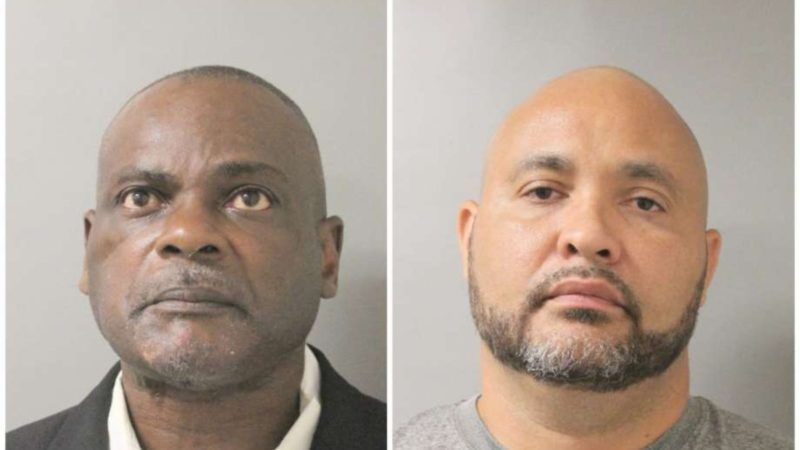Grand Jury Indictments Paint a Picture of Deadly Deceit in Houston Narcotics Division
The charges, which grew out of a lethal 2019 raid based on a fraudulent search warrant affidavit, suggest that cops routinely built their cases on lies.

A Harris County, Texas, grand jury has confirmed the criminal charges against six former Houston narcotics officers that District Attorney Kim Ogg announced on July 1, while adding two more counts against one of the defendants. The 17 felony charges include falsification of search warrants, fraudulent reports of drug purchases, and phony overtime claims. The indictments, which were issued on Friday, reflect the shady practices and lax supervision that enabled veteran Houston police officer Gerald Goines to instigate a deadly 2019 raid based on a drug sale that never happened.
All six defendants—three officers, two sergeants, and a lieutenant—worked for the Houston Police Department's Narcotics Division, which according to an internal audit has been plagued for years by sloppy record keeping and loose oversight. "These indictments reinforce our decision to prosecute the graft, greed and corruption in this troubled Houston Police division," Ogg said. "We look forward to presenting all of the evidence in a courtroom to a jury and the people of Harris County."
Goines, who was employed by the Houston Police Department for 34 years, already faced state murder and record tampering charges, plus federal civil rights and obstruction of justice charges, in connection with the January 28, 2019, raid at 7815 Harding Street. The operation, which was authorized by a no-knock search warrant that Goines obtained based on a fictional heroin purchase, killed Dennis Tuttle and Rhogena Nicholas, the middle-aged couple who lived in the house, but discovered no evidence of drug dealing. The new charges against Goines include three more record tampering counts related to falsification of search warrants, each punishable by six months to two years in jail, and one count of stealing public money by claiming overtime for hours he did not actually work, punishable by two to 10 years in prison.
Former officer Steven Bryant already faced state and federal record tampering charges for backing up Goines' story that a confidential informant had bought heroin from Tuttle. He has now been indicted for theft and for lying about two other purported drug purchases, one of which supposedly involved the same confidential informant who Goines initially claimed had bought heroin from Tuttle.
The other drug buy, which supposedly happened six days before the Harding Street raid, involved Hodgie Armstrong, a former narcotics officer who on July 1 was charged with lying about that transaction. The grand jury added a theft charge and another record tampering charge, related to a false confidential informant form.
Sgt. Clemente Reyna faces three counts of tampering with a government record based on false statements similar to the ones Bryant is accused of making. In December 2018, for example, Reyna claimed to have witnessed Goines' payment to a confidential informant for a drug purchase. Prosecutors say cellphone location data show that meeting never happened, and the informant identified by Goines—again, the same person who supposedly bought heroin from Tuttle—denied participating. Reyna is also charged with theft.
Sgt. Thomas Wood is likewise accused of falsely claiming to have witnessed Goines' payment to a confidential informant, this one in October 2017. Prosecutors say the informant—once again, the same person Goines named during the investigation of the Harding Street raid—denied making the purchase that Goines described, and cellphone data showed Wood could not have observed it in any case. Wood, like Bryant, Goines, Armstrong, and Reyna, is also charged with theft.
Lt. Robert Gonazales is charged with misapplication of fiduciary property, a felony punishable by up to two years in jail, for "reckless handling" of the police department's money. Prosecutors say he violated department rules by approving thousands of dollars in confidential informant payments by Goines and Officer Felipe Gallegos after they had already been made and/or without laboratory testing of the drugs used as evidence in those cases.
More charges are expected. "The new charges show a pattern and practice of lying and deceit," Ogg said on July 1. "Goines and others could never have preyed on our community the way they did without the participation of their supervisors; every check and balance in place to stop this type of behavior was circumvented."
Ogg's office is reviewing drug cases Goines handled and have identified at least 164 questionable convictions—including a 2004 case involving Houston native George Floyd, whose May 25 death at the hands of Minneapolis police officers triggered nationwide protests. So far two people convicted based on Goines' evidence or testimony have been declared "actually innocent."
Houston Police Chief Art Acevedo, who initially lauded the officers who killed Tuttle and Nicholas as "heroes" while posthumously tarring the couple as dangerous drug dealers, has said the scandalous raid did not suggest a "systemic" problem within the Narcotics Division. These charges, combined with the audit results, clearly show he was wrong.
The allegations suggest that officers such as Goines, Bryant, and Armstrong routinely built their cases on lies, while their supervisors not only looked the other way but actively participated in the deceit. The revelations imply that Acevedo, who has been presenting himself as the embodiment of police reform since George Floyd's death, either had no idea what was going on in his department or did not want the public to know.


Show Comments (114)